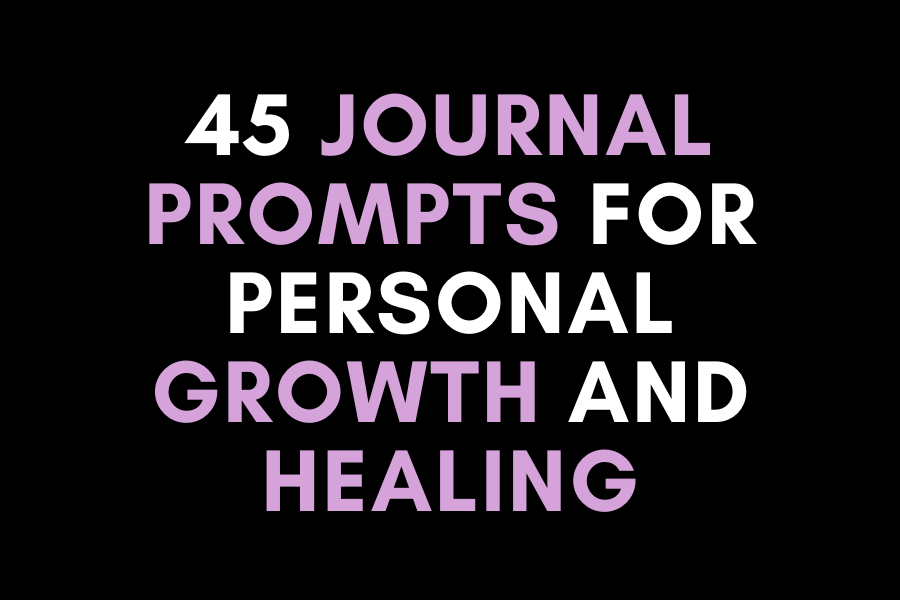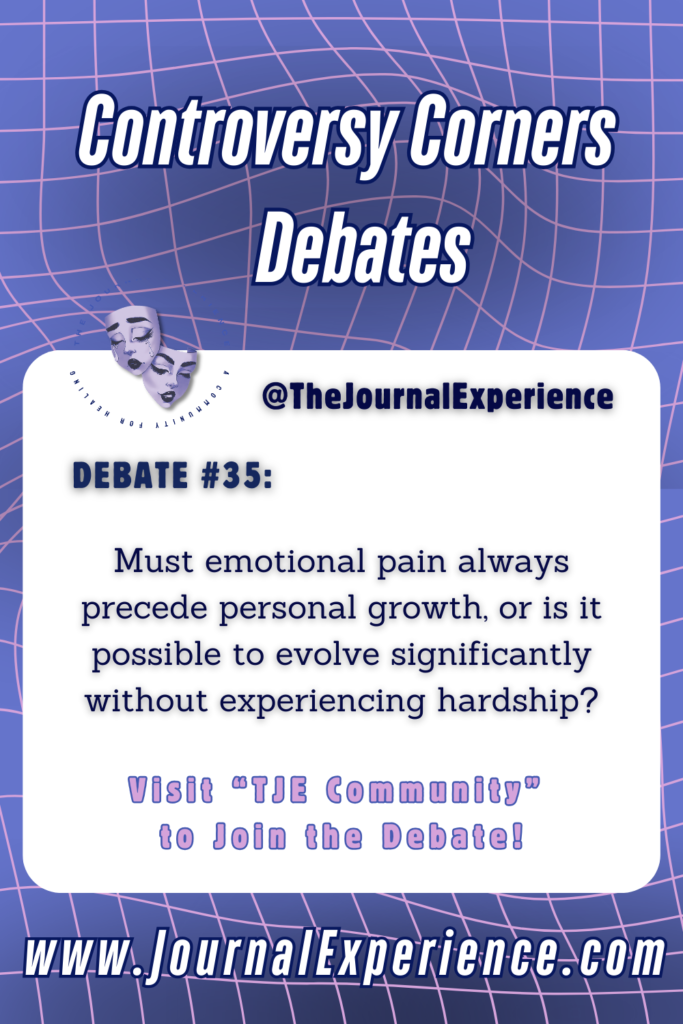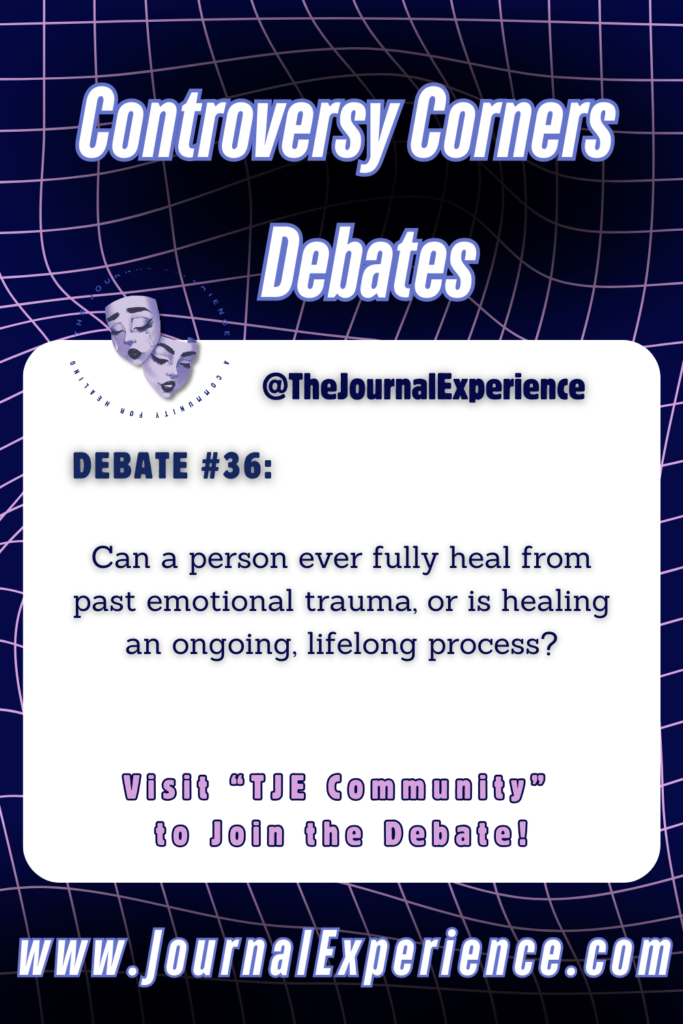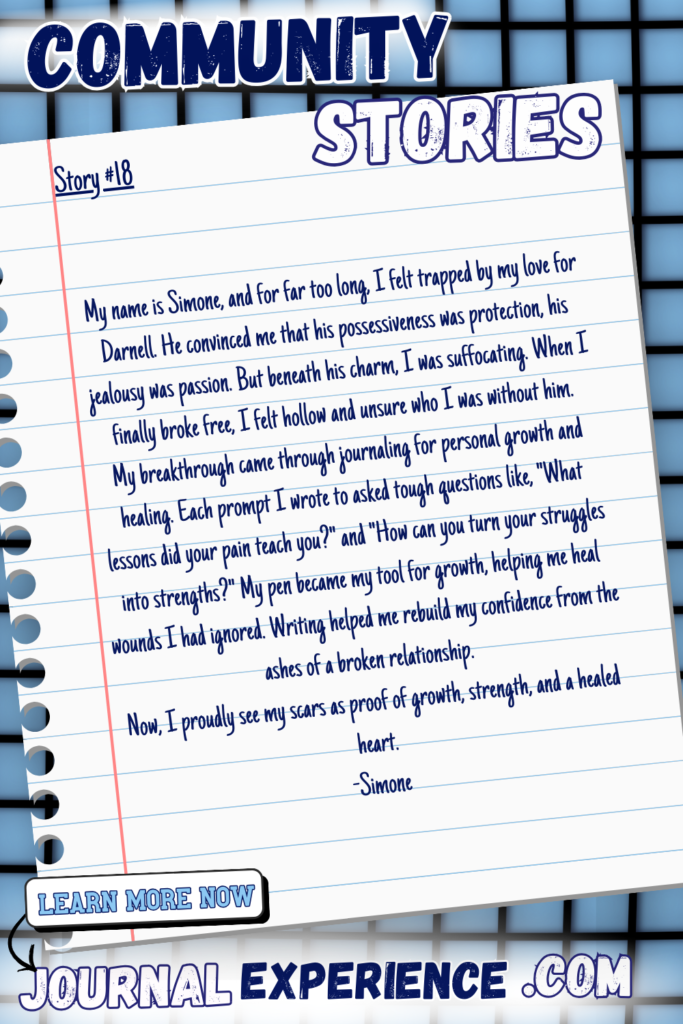Healing and personal growth are not one-time events or achievements—they’re layered, nonlinear journeys filled with both progress and pain. These journeys rarely move in a straight line. Some days feel expansive and clear, while others are clouded with resistance, confusion, or grief. Real growth requires patience, honesty, and the courage to keep returning to yourself—even when it feels hard.

There will be moments when healing feels like a quiet, gentle awakening—where you can finally exhale after holding your breath for too long. And then there will be moments that feel like walking barefoot across old wounds, where you’re forced to revisit the parts of you you thought you had already healed. Both are part of the process. Neither is wrong. Growth isn’t about never hurting again—it’s about learning how to hold your hurt with love.
Journaling becomes an anchor throughout this process. It offers a safe, nonjudgmental space to be fully present with your emotions while also keeping track of your self-improvement. With each entry, you begin to notice the changes within you: how much you’ve grown, how many old beliefs you’ve let go of, and how your self-awareness has deepened. You start to see the healing—not just in milestones, but in the moments you chose not to give up on yourself.
This post offers 45 journal prompts that guide both your healing and personal growth. Whether you’re navigating trauma recovery, rebuilding self-trust, or simply trying to understand yourself better, these prompts are here to walk beside you. They’re not here to fix you—because you were never broken—but to remind you that your healing is sacred, and your growth is unfolding exactly as it should.
Self-Improvement Prompts for Daily Growth
Daily growth isn’t about massive leaps—it’s about steady, intentional movement forward. Real transformation comes from the tiny, often unseen choices you make every day: the decision to speak kindly to yourself, to rest when you’re exhausted, or to try again when you feel discouraged. This section invites you to celebrate the small wins, reflect on what’s working, and stretch into new habits that support your highest self.
These questions create space for reflection, motivation, and meaningful shifts in how you show up for yourself each day. Use them to set direction, reinforce your values, and reconnect to the person you’re becoming—not just who you’ve been.
- What is one small win I’ve had this week?
- What limiting belief do I want to challenge today?
- How do I show up for my future self?
- What habit am I proud of maintaining lately?
- What area of my life feels aligned, and why?
- Where have I made progress, even if it feels slow?
- What motivates me to keep growing?
- What lesson keeps showing up for me lately?
- What does success look like for me today?
- How can I stretch myself just 1% more this week?
- What parts of my routine help me feel grounded?
- What inner strength am I learning to trust?
- What feedback have I received that helped me grow?
- What does self-discipline mean to me, and how can I practice it with compassion?
- Who inspires me to become a better version of myself?

Writing Exercises for Emotional Challenges
Healing and growth both require emotional honesty. Often, the most meaningful breakthroughs come from facing the parts of ourselves we’ve been avoiding: the pain we never voiced, the shame we thought we had to carry alone, the fear that keeps us from reaching for more. This section is about compassionately sitting with those difficult emotions—not to dwell in them, but to understand them.
These prompts are designed to help you explore the harder parts of your emotional landscape with gentleness. Whether you’re unpacking grief, fear, or shame, let these questions be a doorway to self-compassion, emotional clarity, and internal peace. Growth begins when we stop running from our pain and start listening to it.
- What fear keeps holding me back, and what is it trying to protect me from?
- How does shame show up in my life, and how can I respond to it with care?
- What grief am I still carrying, and what needs to be expressed about it?
- Write a letter to your younger self, offering comfort and clarity.
- What would my inner child want me to know right now?
- How do I treat myself when I’m hurting?
- What does it mean to hold space for my emotions?
- Write about a painful memory through the lens of self-compassion.
- What do I need to hear when I feel emotionally overwhelmed?
- What critical voice in my mind needs to be challenged today?
- What are some ways I’ve survived hard moments, and what helped me?
- How does emotional pain manifest in my body, and how can I soothe it?
- What emotion feels most unfamiliar to me, and why?
- What do I want to say but often keep inside?
- What does emotional safety feel like, and do I allow myself to experience it?
Guided Journaling to Support Mental Wellness
Mental wellness is the thread that ties healing and growth together. It’s the invisible foundation that influences how we think, feel, and relate to the world around us. Prioritizing your mental health doesn’t mean you’re broken—it means you’re paying attention. It means you’re choosing to care for yourself with the same intention and tenderness you might offer someone you love.
This section offers prompts to help you become more aware of your thoughts, manage emotional stress, and practice daily mental hygiene. Use these exercises to release mental clutter, name what’s weighing you down, and create space for stillness and stability.
- How is my mental health today, really?
- What thoughts have been occupying most of my headspace lately?
- What does overwhelm feel like in my body, and how can I release it?
- Describe a recent situation that caused stress and how you responded.
- What tools or practices help me calm my mind?
- Visualize a peaceful day and describe every detail—what do you see, feel, hear?
- What message do I need to give myself to feel more at ease?
- If I could rewrite one recurring thought in a more empowering way, what would it be?
- How can I give myself permission to slow down and rest?
- What does mental clarity look and feel like for me?

Emotional Healing Prompts for Inner Restoration
True healing means remembering who you are beneath the pain. It’s the process of returning to your wholeness—not as someone who’s never been hurt, but as someone who has survived and still chooses love. Healing asks us to let go of old identities, rewrite painful narratives, and come home to ourselves again and again.
These final prompts help you explore the emotional territory of forgiveness, self-worth, and resilience. They’re here to support your restoration—to remind you that no matter what’s been lost or broken, there’s still something sacred and powerful within you, waiting to rise.
- Who am I when I’m not defined by past pain?
- What am I ready to forgive myself for?
- What relationship needs healing, and how can I approach it?
- What does it mean to rebuild trust in myself?
- What do I want my healing story to sound like?
Overview
Growth and healing can happen side by side. They don’t cancel each other out—they reinforce each other. Some days, you’ll feel like you’re making strides. Other days, it will be enough just to show up with honesty. Both are valid. Both are powerful.
Journaling gives you the space to feel, learn, and evolve. Every word you write is a step toward deeper understanding and self-trust. Let these 45 prompts guide you back to yourself, one honest answer at a time.

If you’re ready to continue your healing journey with structure, intention, and care, subscribe to The Journal Experience Newsletter or become a TJE Member. You’ll gain access to exclusive member merch , weekly newsletters and blog posts, and a supportive community to help you stay grounded and growing.
Your healing is unfolding. And you are growing through it all.